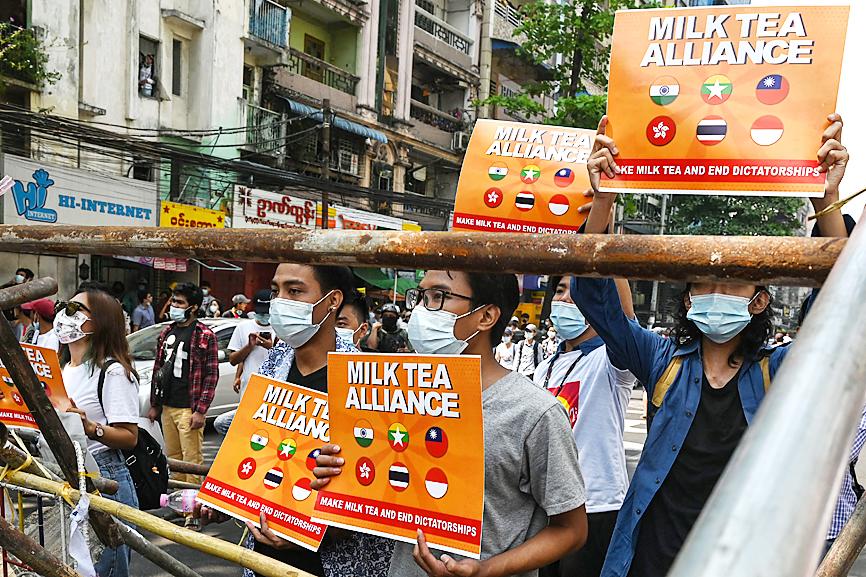Twitter has thrown its support behind the “Milk Tea Alliance” of democracy movements in Taiwan, Hong Kong and elsewhere in Asia, defying China at a time when Beijing is punishing Western companies for commenting on what it considers internal matters.
The social media company yesterday prominently displayed flags of Taiwan, Hong Kong, Myanmar and Thailand while unveiling an emoji to support democracy advocates in places that have in the past few years seen historic protests and share a love for the beverage.
The emoji will automatically show up when users post the #MilkTeaAlliance hashtag, which was posted been 11 million times since last year, Twitter said.

Photo: AFP
Although the company gets the majority of its revenue from the US, and is banned in China along with Facebook and Google, Asia is considered a growth area by the company.
US Internet giants earn advertising revenue through Chinese companies and organizations keen to reach global audiences.
Chinese officials have also increasingly embraced Twitter to counter criticism on a range of topics from snuffing out Hong Kong’s democracy movement to allegations of forced labor in Xinjiang.
Twitter labels such accounts as government entities.
In January, it used its policy against dehumanization to lock the official account of the Chinese embassy in Washington after a post that defended the Chinese Communist Party’s policies in Xinjiang.
Last month, Beijing supported a boycott of clothing retailers amid rising criticism of its policies in the cotton-producing western Chinese region, where international observers have raised concerns about human rights abuses, including detention camps and forced labor.
Spokespeople for Twitter and the Hong Kong government did not immediately respond to requests for comment.
The “Milk Tea Alliance” is increasingly more than just a meme.
Young, digital-savvy democracy advocates across Asia have shared tactics for organizing and sustaining home-grown protest and democracy movements, while trying to ensure that demonstrators and organizers know how to avoid identification or arrest.
Following Hong Kong’s protracted unrest in 2019, several democracy advocates in the territory have voiced support for other democracy movements: First Thai protesters challenging the country’s monarchy and then Burmese demonstrators following a Feb. 1 coup.
Hong Kong democracy advocate Joshua Wong (黃之鋒), who is in jail and faces multiple charges, has said that the alliance is not just about anger over China’s policies toward Taiwan, Hong Kong and Xinjiang, but also about China’s growing influence throughout Asia.
Twitter yesterday also voiced opposition to governments censoring the Internet or suppressing access to wireless networks, a tactic deployed by Myanmar’s military government.
“From #MeToo, #BlackLivesMatter to #MilkTeaAlliance, Twitter continues to play a unique role in enabling the public conversation around important social movements that are happening around the world,” the company said. “During times of civil unrests or violent crackdowns, it is more important than ever for the public to have access to the #OpenInternet for real-time updates, credible information, and essential services. #KeepitOn.”

Taiwan is to commence mass production of the Tien Kung (天弓, “Sky Bow”) III, IV and V missiles by the second quarter of this year if the legislature approves the government’s NT$1.25 trillion (US$39.78 billion) special defense budget, an official said yesterday. Commenting on condition of anonymity, a defense official with knowledge of the matter said that the advanced systems are expected to provide crucial capabilities against ballistic and cruise missiles for the proposed “T-Dome,” an advanced, multi-layered air defense network. The Tien Kung III is an air defense missile with a maximum interception altitude of 35km. The Tien Kung IV and V

The disruption of 941 flights in and out of Taiwan due to China’s large-scale military exercises was no accident, but rather the result of a “quasi-blockade” used to simulate creating the air and sea routes needed for an amphibious landing, a military expert said. The disruptions occurred on Tuesday and lasted about 10 hours as China conducted live-fire drills in the Taiwan Strait. The Civil Aviation Administration (CAA) said the exercises affected 857 international flights and 84 domestic flights, affecting more than 100,000 travelers. Su Tzu-yun (蘇紫雲), a research fellow at the government-sponsored Institute for National Defense and Security Research, said the air

A strong continental cold air mass is to bring pollutants to Taiwan from tomorrow, the Ministry of Environment said today, as it issued an “orange” air quality alert for most of the country. All of Taiwan except for Hualien and Taitung counties is to be under an “orange” air quality alert tomorrow, indicating air quality that is unhealthy for sensitive groups. In China, areas from Shandong to Shanghai have been enveloped in haze since Saturday, the ministry said in a news release. Yesterday, hourly concentrations of PM2.5 in these areas ranged from 65 to 160 micrograms per cubic meter (mg/m³), and pollutants were

Taiwan lacks effective and cost-efficient armaments to intercept rockets, making the planned “T-Dome” interception system necessary, two experts said on Tuesday. The concerns were raised after China’s military fired two waves of rockets during live-fire drills around Taiwan on Tuesday, part of two-day exercises code-named “Justice Mission 2025.” The first wave involved 17 rockets launched at 9am from Pingtan in China’s Fujian Province, according to Lieutenant General Hsieh Jih-sheng (謝日升) of the Office of the Deputy Chief of the General Staff for Intelligence at the Ministry of National Defense. Those rockets landed 70 nautical miles (129.6km) northeast of Keelung without flying over Taiwan,